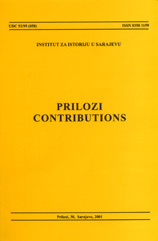Koncepcije Srpskog kulturnog kluba o preuređenju Jugoslavije (1937.-1941.)
The Serbian Cultural Club Concepts on the Reorganization of Yugoslavia (1937-1941).
Author(s): Safet BandžovićSubject(s): History
Published by: Institut za istoriju
Summary/Abstract: The severe party clashes, national disputes, the beginning of the agreement between the Serbian and Croatian sides on territory and administrative reorganization of the Kingdom of Yugoslavia, under the influence of the leading Serbian circles, they initiated to establish the Serbian Cultural Club (SCC) on 15 January 1937, to defend "the endangered interests of the Serbian people" and the new reorganization of Yugoslavia, the Serbian to have a more dominant role. The SCC used to be the carrier of the most extreme nationalistic aspirations. The policy of the militant Serbian nationalism will be accepted as the Draza Mihajlovic chetnik movement programme in the World War II. The SCC was intensive in the places of nationally mixed population, particularly in B-H and other regions, they established their committees and sub-committees. They intended under the slogan "The Serbs to Assemble", to create a centre, where all Serbs should meet. The SCC, after the Cvetkovic-Macek agreement, 1938, demanded under no conditions that B-H should be a part of the Sebian territory. In the activity of the SCC the special part had the district of Vrbas, where the Area Committee was, the seat being in Banjaluka, the president was Dr. Stevan Moljevic. According the programme, not only the Serbs of the Bosanska krajina but those of Lika, Banija, Kordun and North Dalmatia should be incorporated. The Serbs in the mentioned regions, according to Moljevic, were "a human barrier", which had to keep from making the creation of Great Croatia outside of the Yugoslav state and the cessesion of the Serbs in B-H from "the rest of the Serbian people". According the SCC political views Moljevic pointed out that in the Vrbas district, because of suppression of "anti state tendencies" in the "Bosniak idea" and "Franck's" it is "necessary" "to keep and strengthen the human barrier, it is necessary to build up the Vrbas region, while Banja Luka to become a developed cultural centre, to paralyze the influence of Zagreb and Sarajevo if it were in opposition to the general national idea, Banja Luka to be the forward position guard of Belgrade - the carrier of the state and national idea". Sarajevo was accused of being "autonomous", as a carrier of "the Bosniak idea", because of "greed" the area was staying behind. By the end of 1939 the intensive activity of many Serbian societies and unions took place, the result was the establishing of the Serbian national councils, having officially a non-party character, the establishing of the Council of Serbian national and other societies in Sarajevo. In the course of the World War II the pre-war programme objectives were renewed, which should be implemented by the extreme means.
Journal: Prilozi
- Issue Year: 2001
- Issue No: 30
- Page Range: 163-193
- Page Count: 31
- Language: Bosnian

